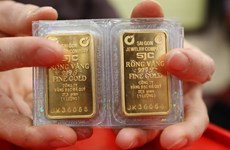Imported glass requires certification
Construction glass importers must
provide customs officials with a certificate of quality proving that
the glass meets the Ministry of Construction’s technical standards
before the goods may enter the country.
Construction glass importers must
provide customs officials with a certificate of quality proving that
the glass meets the Ministry of Construction’s technical standards
before the goods may enter the country.
Under Circular No. 11/2009/TT-BXD, all types of glass products upon initial import are listed as hazardous goods and must comply strictly with quality regulations, said the deputy director of the ministry’s construction materials department, Pham Van Bac.
Certification could be issued by the Construction Materials Control Centre under the ministry’s Construction Materials Institute, or the Construction and Environment Control Laboratory of the Construction Technology and Equipment Consultancy and Inspection Joint Stock Co.
The regulation would play an important role in cutting the heavy flow of sub-standard products into the country, Bac said.
He noted that the new circular was related to enforcing quality standards and did not violate Vietnam ’s WTO commitments against erecting trade barriers.
“These technical barriers are significant under the present circumstances, with domestic glass consumption declining due to the recession and glass imports easily entering the market without inspection,” said Viglacera general director Le Minh Tuan, who is also general secretary of the Vietnam Glass Association.
“Technical barriers help prevent unlawful imports and also protect consumer rights, keep construction work safe and boost domestic glass production,” Tuan said.
“Glass importers often declare false prices and types of products to customs officials to enjoy low import tariffs, then sell the products on the domestic market at prices undercutting domestic manufacturers,” he added.
This was unhealthy competition, harmful to domestic producers who have had to sell at prices 30-35 percent higher than some imported products, he said. Because it was hard to distinguish the qualities of glass, many sub-standard products have been sold on the local market, putting construction projects and investments at risk. Therefore, the new regulations were necessary to tighten controls on the quality of imported glass, Tuan said, and such technical barriers were consistent with what other countries have long done.
Under Circular No. 11/2009/TT-BXD, all types of glass products upon initial import are listed as hazardous goods and must comply strictly with quality regulations, said the deputy director of the ministry’s construction materials department, Pham Van Bac.
Certification could be issued by the Construction Materials Control Centre under the ministry’s Construction Materials Institute, or the Construction and Environment Control Laboratory of the Construction Technology and Equipment Consultancy and Inspection Joint Stock Co.
The regulation would play an important role in cutting the heavy flow of sub-standard products into the country, Bac said.
He noted that the new circular was related to enforcing quality standards and did not violate Vietnam ’s WTO commitments against erecting trade barriers.
“These technical barriers are significant under the present circumstances, with domestic glass consumption declining due to the recession and glass imports easily entering the market without inspection,” said Viglacera general director Le Minh Tuan, who is also general secretary of the Vietnam Glass Association.
“Technical barriers help prevent unlawful imports and also protect consumer rights, keep construction work safe and boost domestic glass production,” Tuan said.
“Glass importers often declare false prices and types of products to customs officials to enjoy low import tariffs, then sell the products on the domestic market at prices undercutting domestic manufacturers,” he added.
This was unhealthy competition, harmful to domestic producers who have had to sell at prices 30-35 percent higher than some imported products, he said. Because it was hard to distinguish the qualities of glass, many sub-standard products have been sold on the local market, putting construction projects and investments at risk. Therefore, the new regulations were necessary to tighten controls on the quality of imported glass, Tuan said, and such technical barriers were consistent with what other countries have long done.













